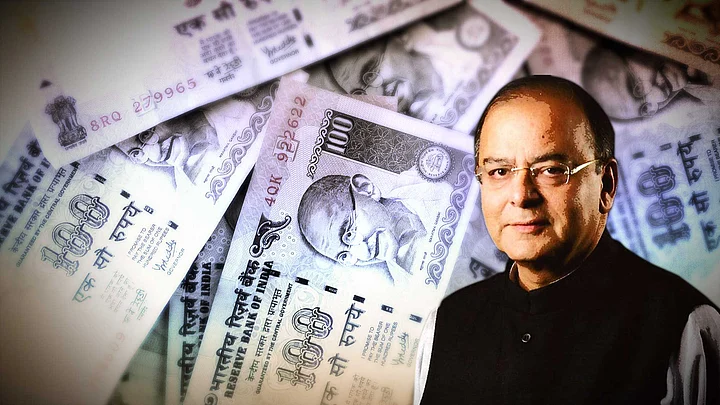With all eyes on the Union Budget, investors and industry are hoping it will give a firm direction to the domestic stock market on either side – hopefully northward.
The equity market, bruised by global headwinds, can climb out of its present rut only if the finance minister can pull off a good balancing act by addressing the key concerns of the economy without compromising on fiscal consolidation. While that may sound tough, some believe it’s entirely doable. Others remain wary.
ADVERTISEMENTREMOVE AD
Expect ‘Run-of-the-Mill’ Budget: Nomura
The Budget will be a tightrope walk. We do not expect a ‘gamechanger’, but rather a ‘run-of-the-mill’ Budget.
- The Centre will meet its fiscal deficit target of 3.9 percent of GDP in the current financial year, but in 2016-17 it might slip to 3.7 percent against an earlier target of 3.5 percent.
- The increase in wages and pensions burden owing to the Seventh Pay Commission and the One Rank One Pension scheme will be the main reasons for the slippage.
- The government may hike the service tax rate to 16 percent from the current 14.5 percent as a step towards moving to the revenue-neutral GST rate at around 18 percent.
- No major changes are expected in direct taxes.
Fiscal Consolidation Must Continue: Morgan Stanley
Further fiscal consolidation is an imperative. It has brought in great rewards. Instead of abandoning it, the government must rationalise expenditure and subsidies.Ridham Desai, MD, Morgan Stanley to an ET panel
ADVERTISEMENTREMOVE AD
3.5 Percent Fiscal Deficit Target Achievable: Citigroup
A fiscal deficit target of 3.5 percent is achievable on account of higher revenues from a rise in the petroleum excise duty, a hike in service taxes, possible SUUTI (Specified Undertaking of UTI) stake sale.
ADVERTISEMENTREMOVE AD

ADVERTISEMENTREMOVE AD
Expect a Big Infra Push in the Budget: Edelweiss Securities
Housing finance companies, EPC players and the logistics sector will be the key beneficiaries of a big infra push over the next several years. Beaten-down PSU banks will benefit if capitalisation plans are clearly tabled.
Cut our FY17 target for Nifty to 8,700-9,300 from 9,525-10,160 levels, reflecting a cut in FY17 earnings. The market is poorly positioned given global riskoff, earnings deficiency and lack of monetary deflation.
ADVERTISEMENTREMOVE AD
Abolition of Double Tax Can Boost Equity Markets: Motilal Oswal Financial Services
Double taxation has to be abolished if you really want equity markets to fire up. The financial markets are looking forward to what the government has to do about kickstarting by investment in the economy.
Expect higher capital allocation for state-run banks, which are starved of capital. The government may, in a surprise move, lift the foreign ownership limit in such banks from the current level of 20 percent.
ADVERTISEMENTREMOVE AD

ADVERTISEMENTREMOVE AD
Govt Must Spend on Growth-Stimulating Areas: Credit Suisse
Don’t expect the allocation to public sector banks to go up significantly from Rs 25,000 crore or Rs 40,000 crore levels, as there is no clarity on how big the hole really is, which banks are at risk, how much loss they are staring at and how to really go about addressing the problem. The market and investors will focus more on the nature of spending. If the government increase spending, taxes will also go up and that way the overall fiscal impact will be zero. The trick will be in the government’s ability to find resources and spend them on the growth-stimulating areas.Neelkanth Mishra, India Equity Strategist, Credit Suisse to an ET panel
ADVERTISEMENTREMOVE AD
Budget to Have a Strong Infra Focus: Angel Broking
Conviction picks include Sadbhav Engineering and KNR Constructions, as the Budget is expected to have a strong focus on the roads/highway sector. BEL will remains the best play on defence spending.
We feel investment spending will continue to remain a high priority in this Budget and infrastructure, cement and capital goods companies would be the direct beneficiaries of it.
ADVERTISEMENTREMOVE AD
Long-term Capital Gains May Come Back to Haunt: Enam
The Budget may not be that great. But the fear is there are hints that long-term capital gains may come back in some form. That would be disastrous for the market
ADVERTISEMENTREMOVE AD

ADVERTISEMENTREMOVE AD
A Tightrope Walk Between Fisc and Growth: BofA ML
- Budget 2016 will target FY17 fiscal deficit at 3.8 percent of GDP as it walks a tightrope between supporting growth and trying to maintain fiscal credibility.
- The gross tax revenue is expected to grow at 14.2 percent, marginally higher than this fiscal’s 12.7 percent, building in a shallow recovery to 6.3 percent GDP growth in FY17 from 5.5 percent this year.
- Expect subsidies to continue to come off to 1.5 percent of GDP in FY17 from 1.7 percent earlier on account of falling oil.
ADVERTISEMENTREMOVE AD
FM Will Budget For Higher Capex, Spend on OROP: Kotak Securities
Expect the Budget to be positive for auto, banking/NBFCs, capital goods, cement, construction, metals & mining, oil & gas, paints, power, shipping & logistics sectors.
The FM’s priority will be higher growth, with fiscal rectitude. With the private sector capex yet to pick up, he will budget for higher plan capital expenditure ( investments), in addition to the higher spends on OROP and CPC, which need to be factored in. These will be proposed to be financed by higher revenues from divestment/privatisation, higher indirect tax rates, telecom auctions and better tax compliance, apart from a cut in non-plan expenditure (subsidies) via DBT (Direct Benefit Transfer).
(At The Quint, we question everything. Play an active role in shaping our journalism by becoming a member today.)
Read Latest News and Breaking News at The Quint, browse for more from news and business
Topics: General Budget 2016 Budget 2016
Published:
